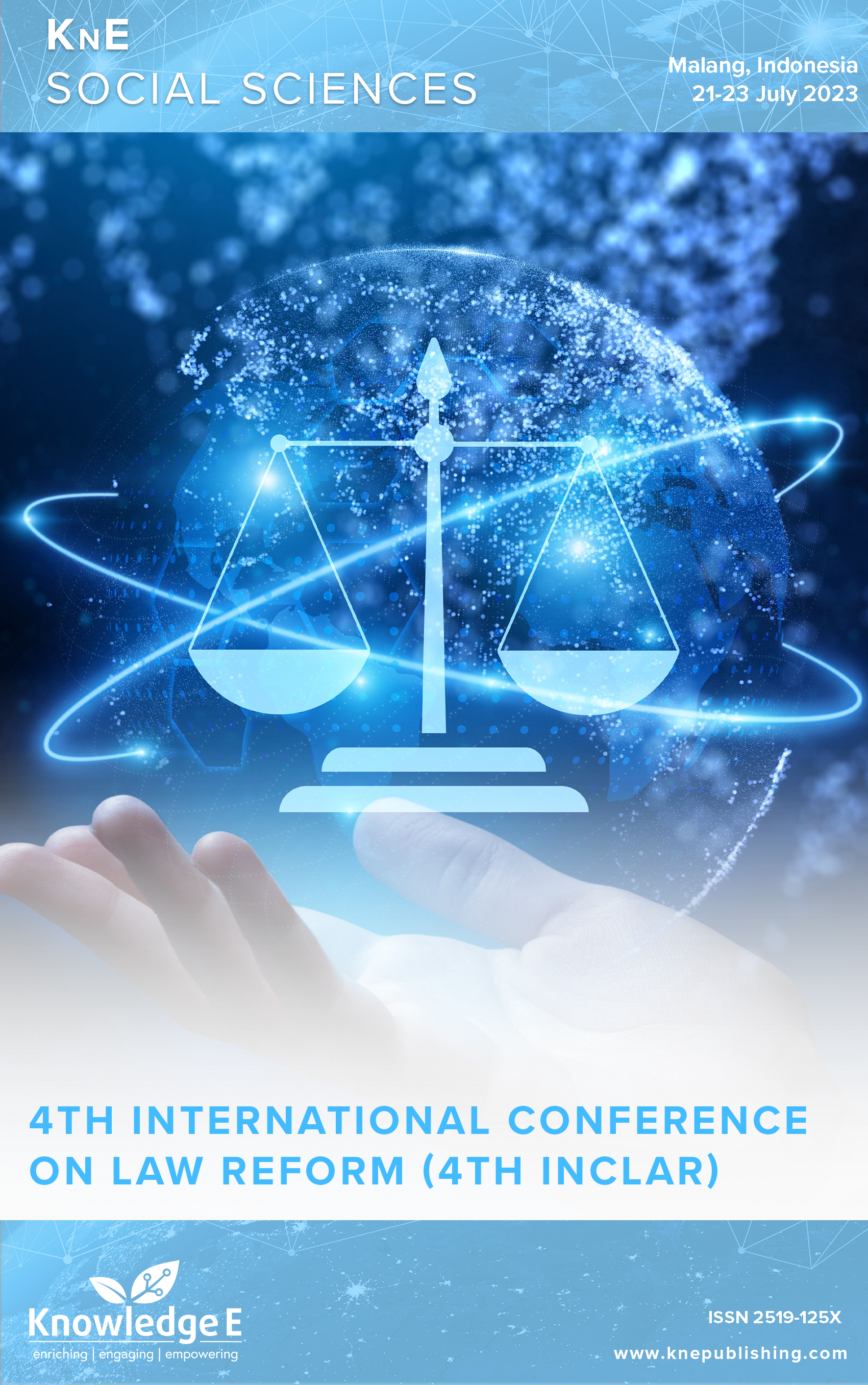The Legality of Intellectual Property by Artificial Intelligence in Indonesia
DOI:
https://doi.org/10.18502/kss.v8i21.14791Abstract
This study aims to examine the legitimacy of intellectual property generated by artificial intelligence (AI) in Indonesia. With the rapid development of AI, intellectual property generated by AI has become a complex issue, attracting the attention of legal experts and stakeholders. Although the legal framework in Indonesia does not specifically address intellectual property generated by AI, certain aspects of existing law may apply in this context. This study uses normative or doctrinal research methods to analyze the legal framework in Indonesia regarding intellectual property, including copyright law, patent law, industrial design law, and trade secret protection. In addition, this research examines the views of legal experts and stakeholders in Indonesia regarding the legitimacy of intellectual property generated by AI. The results of this research are expected to provide a clearer understanding of the legality of intellectual property law produced by AI in Indonesia. Research results will contribute to discussions around AIrelated laws and regulations and may serve as the basis for future regulatory changes or adjustments. This study has significant implications for stakeholders, including AI creators, users, and developers in Indonesia. By understanding the applicable legal framework, appropriate legal protection frameworks can be created for AI-generated intellectual property, promoting continuous innovation and responsible utilization of AI.
Keywords: artificial intelligence, intellectual property, legality
References
Pakpahan R. Analisa Pengaruh Implementasi Artificial Intelligence dalam Kehidupan Manusia. J. Inf. Syst. Informatics Comput. 2021;5(2):506–13. DOI: https://doi.org/10.52362/jisicom.v5i1.465
Sumadi MI, Putra R, Firmansyah A. “Peran Perkembangan Teknologi Pada Profesi Akuntan Dalam Menghadapi Industri 4.0 Dan Society 5.0,” J. Law, Adm. Soc Sci. 2022;2(1):56–68. DOI: https://doi.org/10.54957/jolas.v2i1.162
Disemadi HS. Urgensi Regulasi Khusus dan Pemanfaatan Artificial Intelligence dalam Mewujudkan Perlindungan Data Pribadi di Indonesia. Wawasan Yuridika. 2021;5(2):177–99. DOI: https://doi.org/10.25072/jwy.v5i2.460
Jaya F, Goh W. ANALISIS YURIDIS TERHADAP KEDUDUKAN KECERDASAN BUATAN ATAU ARTIFICIAL INTELLIGENCE SEBAGAI SUBJEK HUKUM PADA HUKUM POSITIF INDONESIA. Supremasi Huk. 2021;17(2):1–11. DOI: https://doi.org/10.33592/jsh.v17i2.1287
Muhaimin, Metode Penelitian Hukum. Mataram: Mataram University Press; 2020.
Muhammad Syahrum M. ST., Pengantar Metode Penelitian Hukum, Kajian Penelitian Normatif, Empiris, Penulisan Proposal, Laporan Skripsi dan Tesis, Cetakan Pe. Riau: DOTPLUS Publisher; 2022.
Marzuki PM. Penelitian Hukum. Jakarta: Kencana; 2010.
Moleong LJ. Metodologi Penelitian Kualitatif. Bandung: Remaja Rosda Karya; 2006.
V. Shah and K. Pandey, “Creation of Intellectual Property Rights With The Development of Artificial Intelligence,” vol. IV, no. Ii, pp. 1–7.
Ahuja VK. “ARTIFICIAL INTELLIGENCE AND COPYRIGHT: ISSUES AND CHALLENGES,” ILI Law Rev., pp. 270–285, 2020.
Fauzi R, Ramli TS, Permata RR. Masa Depan Hak Cipta: Tinjauan Keabsahan Hasil Karya Kecerdasan Artifisial Di Indonesia. Citiz. J. Ilm. Multidisiplin Indones. 2022;2(1):118–28. DOI: https://doi.org/10.53866/jimi.v2i1.51
A. N. Fadilla, P. M. Ramadhani, and Handriyotopo, “Problematika Penggunaan AI Artificial Intellegence di Bidang Ilustrasi : Artist AI. Citrawira J. 2023;4(1):129–36. DOI: https://doi.org/10.33153/citrawira.v4i1.4741
Gema AJ. Masalah Penggunaan Ciptaan sebagai Data Masukan dalam Pengembangan Artificial Intelligence di Indonesia. Technol. Econ. Law J. 2022;1(1):1–18. DOI: https://doi.org/10.21143/TELJ.vol1.no1.1000
Prastiwi CH, Pujiawati N. Penggabungan Artificial Intelligence dan Kecerdasan Alami dalam Pembelajaran Keterampilan Menulis Bahasa Inggris. Pros. Semin. Nas. Pascasarj; 2019. pp. 1–7.
M. Sobron and Lubis, “Implementasi Artificial Intelligence Pada System Manufaktur Terpadu,” Semin. Nas. Tek. UISU, vol. 4, no. 1, pp. 1–7, 2021, [Online]. Available: https://jurnal.uisu.ac.id/index.php/semnastek/article/view/4134
Siregar H, Setiawan W, Dirgantari PD. Isu Proses Bisnis Berbasis Artificial Intelligence untuk Menyosong Era Industri 4.0. J. Bisnis Strateg. 2020;29(2):89–100. DOI: https://doi.org/10.14710/jbs.29.2.89-100
Bagus Pratama Y, Dalimunthe NP. Implementasi Teknik Computer Vision Untuk Deteksi Viridiplantae Pada Lahan Pasca Tambang. Bull. Comput. Sci. Res. 2022;3(1):64–72. DOI: https://doi.org/10.47065/bulletincsr.v3i1.193
Muhaemin M. “Analisis Pemanfaatan Artificial Intelligence (AI) sebagai Referensi dalam Desain Komunikasi Visual,” SASAK DESAIN Vis. DAN Komun., vol. 5, no. 1, pp. 71–80, 2023, [Online]. Available: https://journal. universitasbumigora.ac.id/index.php/sasak/workflow/index/868/5?71JournalSasak https://journal.universitasbumigora.ac.id/index.php/sasak/index DOI: https://doi.org/10.30812/sasak.v5i1.2966
Ravizki EN, Lintang Yudhantaka. Artificial Intelligence Sebagai Subjek Hukum: Tinjauan Konseptual dan Tantangan Pengaturan di Indonesia. Notaire. 2022;5(3):351– 76. DOI: https://doi.org/10.20473/ntr.v5i3.39063
T. S. Ramli, A. M. Ramli, R. F. Mayana, E. Ramadayanti, and R. Fauzi, “Artificial intelligence as object of intellectual property in Indonesian law,” J. World Intellect. Prop., no. July 2022, pp. 142–154, 2023, https://doi.org/10.1111/jwip.12264. DOI: https://doi.org/10.1111/jwip.12264
N. I. Rahmahafida and W. B. Sinag, “Analisis Problematika Lukisan Ciptaan Artificial Intelligence Menurut Undang-Undang Hak Cipta,” J. Pendidik. dan Konseling, vol. 4, no. 6, pp. 9688–9696, 2022.
Atsar A, Sutrisno B. Tanggungjawab Kecerdasan Buatan Sebagai Subjek Hukum Paten Di Indonesia. Volume 1. Proceeding Justicia Conf; 2022. pp. 24–5. [Online], Available https://jurnal.unsur.ac.id/PJC/article/view/2093%0A https://jurnal.unsur.ac. id/PJC/article/view/2093/1571
E. M. RISTIANTI. “HAK ATAS KEKAYAAN INTELEKTUAL (HAKI) DALAM DUNIA TEKNOLOGI INDUSTRI BERBASIS REVOLUSI 4.0 DI INDONESIA,” no. 1, pp. 1–14, 2004.
Baihaqi WM, Sulistiyana F, Fadholi A. Pengenalan Artificial Intelligence Untuk Siswa Dalam Menghadapi Dunia Kerja Di Era Revolusi Industri 4.0. RESWARA J. Pengabdi. Kpd. Masy. 2021;2(1):79–88. DOI: https://doi.org/10.46576/rjpkm.v2i1.876
Simbolon Y. PERTANGGUNGJAWABAN PERDATA TERHADAP ARTIFICIAL INTELLIGENCE YANG MENIMBULKAN KERUGIAN MENURUT HUKUM DI INDONESIA. VeJ. 2023;9(1):246–73. DOI: https://doi.org/10.25123/vej.v9i1.6037
Prihastomo Y, Kosala R, Supangkat SH, Ranti B, Trisetyarso A. Theoretical framework of smart intellectual property office in developing countries. Procedia Comput Sci. 2019;161:994–1001. DOI: https://doi.org/10.1016/j.procs.2019.11.209
Kurniawijaya A, Yudityastri A, Zuama AP. Pendayagunaan Artificial Intelligence Dalam Perancangan Kontrak Serta Dampaknya Bagi Sektor Hukum Di Indonesia. Khatulistiwa Law Rev. 2021;2(1):260–79. DOI: https://doi.org/10.24260/klr.v2i1.108
Hapsari DR, Kurniawan KD. Consumer Protection in the Banking Credit Agreement in Accordance with the Principle of Proportionality under Indonesian Laws. Fiat Justisia J. Ilmu Huk. 2020;14(4):337–52. DOI: https://doi.org/10.25041/fiatjustisia.v14no4.1884

